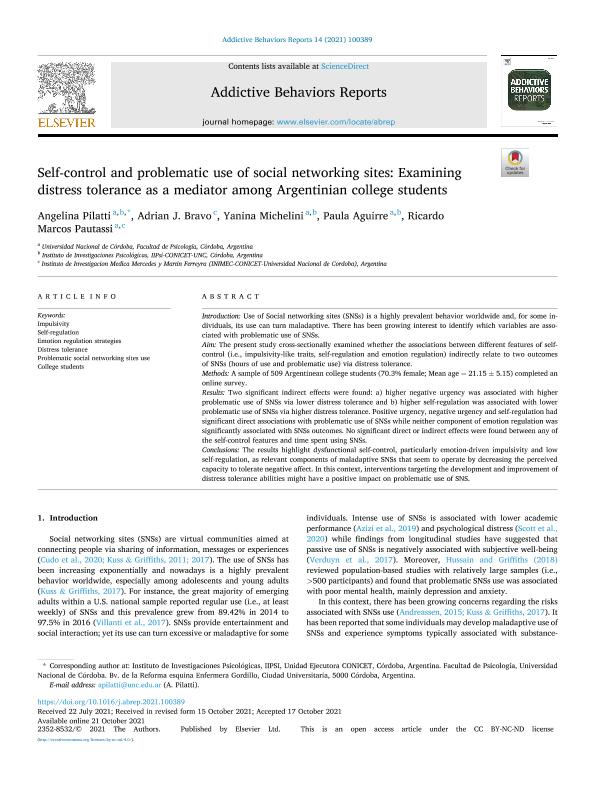Mostrar el registro sencillo del ítem
dc.contributor.author
Pilatti, Angelina

dc.contributor.author
Bravo, Adrián J.
dc.contributor.author
Michelini, Yanina Noelia

dc.contributor.author
Aguirre, Paula
dc.contributor.author
Pautassi, Ricardo Marcos

dc.date.available
2022-03-11T17:24:04Z
dc.date.issued
2021-12-21
dc.identifier.citation
Pilatti, Angelina; Bravo, Adrián J.; Michelini, Yanina Noelia; Aguirre, Paula; Pautassi, Ricardo Marcos; Self-control and problematic use of social networking sites: Examining distress tolerance as a mediator among Argentinian college students; Elsevier; Addictive Behaviors Reports; 14; 21-12-2021; 1-9
dc.identifier.issn
2352-8532
dc.identifier.uri
http://hdl.handle.net/11336/153277
dc.description.abstract
Introduction: Use of Social networking sites (SNSs) is a highly prevalent behavior worldwide and, for some individuals, its use can turn maladaptive. There has been growing interest to identify which variables are associated with problematic use of SNSs. Aim: The present study cross-sectionally examined whether the associations between different features of self-control (i.e., impulsivity-like traits, self-regulation and emotion regulation) indirectly relate to two outcomes of SNSs (hours of use and problematic use) via distress tolerance. Methods: A sample of 509 Argentinean college students (70.3% female; Mean age = 21.15 ± 5.15) completed an online survey. Results: Two significant indirect effects were found: a) higher negative urgency was associated with higher problematic use of SNSs via lower distress tolerance and b) higher self-regulation was associated with lower problematic use of SNSs via higher distress tolerance. Positive urgency, negative urgency and self-regulation had significant direct associations with problematic use of SNSs while neither component of emotion regulation was significantly associated with SNSs outcomes. No significant direct or indirect effects were found between any of the self-control features and time spent using SNSs. Conclusions: The results highlight dysfunctional self-control, particularly emotion-driven impulsivity and low self-regulation, as relevant components of maladaptive SNSs that seem to operate by decreasing the perceived capacity to tolerate negative affect. In this context, interventions targeting the development and improvement of distress tolerance abilities might have a positive impact on problematic use of SNS.
dc.format
application/pdf
dc.language.iso
eng
dc.publisher
Elsevier

dc.rights
info:eu-repo/semantics/openAccess
dc.rights.uri
https://creativecommons.org/licenses/by-nc-nd/2.5/ar/
dc.subject
COLLEGE STUDENTS
dc.subject
DISTRESS TOLERANCE
dc.subject
EMOTION REGULATION STRATEGIES
dc.subject
IMPULSIVITY
dc.subject
PROBLEMATIC SOCIAL NETWORKING SITES USE
dc.subject
SELF-REGULATION
dc.subject.classification
Otras Psicología

dc.subject.classification
Psicología

dc.subject.classification
CIENCIAS SOCIALES

dc.title
Self-control and problematic use of social networking sites: Examining distress tolerance as a mediator among Argentinian college students
dc.type
info:eu-repo/semantics/article
dc.type
info:ar-repo/semantics/artículo
dc.type
info:eu-repo/semantics/publishedVersion
dc.date.updated
2021-12-03T19:23:25Z
dc.journal.volume
14
dc.journal.pagination
1-9
dc.journal.pais
Reino Unido

dc.description.fil
Fil: Pilatti, Angelina. Universidad Nacional de Córdoba. Instituto de Investigaciones Psicológicas. - Consejo Nacional de Investigaciones Científicas y Técnicas. Centro Científico Tecnológico Conicet - Córdoba. Instituto de Investigaciones Psicológicas; Argentina
dc.description.fil
Fil: Bravo, Adrián J.. Consejo Nacional de Investigaciones Científicas y Técnicas. Centro Científico Tecnológico Conicet - Córdoba. Instituto de Investigación Médica Mercedes y Martín Ferreyra. Universidad Nacional de Córdoba. Instituto de Investigación Médica Mercedes y Martín Ferreyra; Argentina
dc.description.fil
Fil: Michelini, Yanina Noelia. Universidad Nacional de Córdoba. Instituto de Investigaciones Psicológicas. - Consejo Nacional de Investigaciones Científicas y Técnicas. Centro Científico Tecnológico Conicet - Córdoba. Instituto de Investigaciones Psicológicas; Argentina
dc.description.fil
Fil: Aguirre, Paula. Universidad Nacional de Córdoba. Instituto de Investigaciones Psicológicas. - Consejo Nacional de Investigaciones Científicas y Técnicas. Centro Científico Tecnológico Conicet - Córdoba. Instituto de Investigaciones Psicológicas; Argentina
dc.description.fil
Fil: Pautassi, Ricardo Marcos. Consejo Nacional de Investigaciones Científicas y Técnicas. Centro Científico Tecnológico Conicet - Córdoba. Instituto de Investigación Médica Mercedes y Martín Ferreyra. Universidad Nacional de Córdoba. Instituto de Investigación Médica Mercedes y Martín Ferreyra; Argentina
dc.journal.title
Addictive Behaviors Reports
dc.relation.alternativeid
info:eu-repo/semantics/altIdentifier/url/https://linkinghub.elsevier.com/retrieve/pii/S2352853221000523
dc.relation.alternativeid
info:eu-repo/semantics/altIdentifier/doi/http://dx.doi.org/10.1016/j.abrep.2021.100389
Archivos asociados
